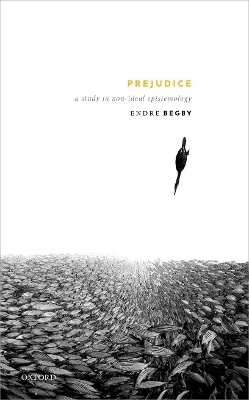
Prejudice
Oxford University Press (Verlag)
978-0-19-885283-4 (ISBN)
Prejudiced beliefs may certainly seem like defective beliefs. But in what sense are they defective? Many will be false and harmful, but philosophers have further argued that prejudiced belief is defective also in the sense that it could only arise from distinctive kinds of epistemic irrationality: we could acquire or retain our prejudiced beliefs only by violating our epistemic responsibilities. It is also assumed that we are only morally responsible for the harms that prejudiced beliefs cause because, in forming these beliefs in the first place, we are violating our epistemic responsibilities. In Prejudice, Endre Begby argues that these common convictions are misguided. His discussion shows in detail that there are many epistemically justified pathways to prejudiced belief, and that it is a mistake to lean on the concept of epistemic responsibility to articulate our ethical responsibilities. Doing so unreasonably burdens victims of prejudice with having to show that their victimizers were in a position to know better. Accordingly, Begby provides an account of moral responsibility for harm which does not depend on finding grounds for epistemic blame. This view is supported by a number of examples and case studies at individual, collective, and institutional levels of decision making. Additionally, Begby develops a systematic platform for "non-ideal epistemology" which would apply to a wide range of other social and epistemic phenomena of current concern, such as fake news, conspiracy theories, science scepticism, and more.
Endre Begby received his MA degree from the University of Oslo and his Ph.D. from the University of Pittsburgh. He is currently an Associate Professor of Philosophy at Simon Fraser University. His areas of specialization include epistemology, philosophy of language, philosophy of mind, as well as social and political philosophy.
Preface
1: Prejudice from an epistemological point of view
2: The psychology of stereotypes
3: From psychology to philosophy: the case for non-ideal epistemology
4: The epistemology of prejudice acquisition
5: The epistemology of prejudice maintenance
6: Evidential preemption
7: Common ground: the peculiar epistemology of culturally normal belief
8: Automated risk assessment in the criminal justice process: a case of algorithmic bias ?
9: Moral constraints on belief?
10: A better approach: moral responsibility despite epistemic blamelessness
References
| Erscheinungsdatum | 26.04.2021 |
|---|---|
| Verlagsort | Oxford |
| Sprache | englisch |
| Maße | 144 x 221 mm |
| Gewicht | 414 g |
| Themenwelt | Geisteswissenschaften ► Philosophie ► Erkenntnistheorie / Wissenschaftstheorie |
| Geisteswissenschaften ► Philosophie ► Ethik | |
| Geisteswissenschaften ► Psychologie ► Sozialpsychologie | |
| ISBN-10 | 0-19-885283-5 / 0198852835 |
| ISBN-13 | 978-0-19-885283-4 / 9780198852834 |
| Zustand | Neuware |
| Haben Sie eine Frage zum Produkt? |
aus dem Bereich


![Was heißt Denken?. Vorlesung Wintersemester 1951/52. [Was bedeutet das alles?] - Martin Heidegger](/media/113619842)